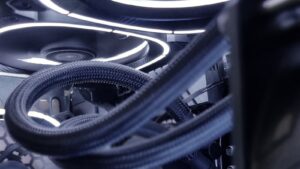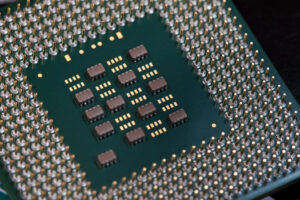Unveiling the ultimate battle of processing power, welcome to the Overclocking Showdown! In this thrilling encounter between CPUs and GPUs, we delve into the realm of boosted performance, pushing the boundaries of speed and precision. Brace yourselves for a head-to-head clash between two titans, each vying for the prestigious title of delivering the best gains in performance. With our unbiased approach, we will uncover the hidden potential in both processors, shedding light on the age-old question: which, in the end, offers the ultimate boost? So buckle up, dear readers, as we embark on this epic journey to determine who truly reigns supreme in the overclocking realm.
1. Unlocking the Power: Exploring the Potential of Overclocking CPUs and GPUs
When it comes to maximizing performance, overclocking is a popular technique that many enthusiasts turn to. Whether it be CPUs or GPUs, the potential for unlocking higher speeds and improved performance is certainly intriguing. In this overclocking showdown, we’ll delve into the world of CPU and GPU overclocking, comparing the two and determining which offers the best performance gains.
First up, let’s explore the realm of CPU overclocking. By pushing the clock speed of your processor beyond its factory limits, you can experience faster computing and smoother multitasking. The key to successful CPU overclocking lies in finding the perfect balance between increased clock speeds and stable operation. It’s a delicate process that requires careful monitoring of temperatures and voltages to prevent any potential damage.
On the other hand, GPU overclocking is all about maximizing graphics performance. By increasing the clock speed and voltage of your graphics card, you can squeeze out every drop of power and enhance your gaming experience. Whether you’re playing the latest AAA titles or diving into creative applications that demand high-end GPU performance, overclocking your graphics card can lead to sharper visuals, smoother gameplay, and reduced input lag.
2. Measuring the Performance Impact: Analyzing the Pros and Cons of Overclocking CPUs and GPUs
In the world of PC enthusiasts, the quest for ultimate performance knows no bounds. One way to push the limits of your hardware is through overclocking – a method that can unlock hidden power within your CPUs and GPUs. But, is it worth the risks? Let’s dive into the fascinating realm of overclocking and find out which component, CPU or GPU, offers the best performance gains when pushed to their limits.
Pros of Overclocking CPUs:
1. Increased Processing Power: Overclocking a CPU can lead to significant boosts in overall processing speed, allowing for faster multitasking, smoother gameplay, and improved performance in demanding applications.
2. Cost-Effective Upgrade: Instead of buying a new CPU, overclocking offers a cost-effective way to extract more performance from your existing hardware.
3. Fine-Tuning Capabilities: Overclocking gives you the ability to fine-tune your CPU’s settings, allowing for personalized optimization based on your specific needs and requirements.
4. Competitive Advantage: Particularly in the world of gaming, overclocking can give you a competitive edge by providing higher frame rates and reducing lag, resulting in a more immersive and responsive gaming experience.
Cons of Overclocking CPUs:
1. Thermal Concerns: Higher clock speeds lead to increased heat generation, which can put additional stress on your CPU and potentially shorten its lifespan if not adequately cooled.
2. Stability Issues: Overclocking can make your system more prone to crashes or instability if not done properly. It requires careful monitoring, testing, and tweaking to find the right balance between performance and stability.
3. Voiding Warranty: In many cases, overclocking your CPU will void its warranty, leaving you responsible for any potential damage or malfunctions that may occur during the process.
Pros of Overclocking GPUs:
1. Enhanced Gaming Performance: Overclocking your GPU can result in higher frame rates, smoother gameplay, and improved graphics quality, making it ideal for gamers looking to maximize their visual experience.
2. Increased Rendering Speed: GPU overclocking can considerably speed up rendering times, benefitting professionals working with graphics-intensive software like video editing or 3D modeling.
3. Customizability: Similar to CPUs, overclocking GPUs enables users to fine-tune performance settings and tailor their graphics card’s capabilities to meet their specific needs.
Cons of Overclocking GPUs:
1. Heat and Power Consumption: Just like CPUs, overclocking a GPU generates additional heat and power consumption. As a result, it may require improved cooling solutions and higher energy usage.
2. Potential Instability: Pushing your GPU beyond its factory settings can lead to crashes or system instability, necessitating careful monitoring and tweaking.
3. Voiding Warranty: Overclocking your GPU voids its warranty in most cases, meaning you’re solely responsible for any potential damages or issues that may arise during overclocking.
When it comes to overclocking, both CPUs and GPUs have their unique advantages and drawbacks. Careful consideration of the pros and cons, alongside diligent testing and monitoring, will help you determine the best approach to unleash the true performance potential of your hardware.
3. A Game of Trade-Offs: Weighing the Benefits and Risks of Overclocking CPUs and GPUs
In the world of computer gaming, performance is everything. Gamers are always on the hunt for ways to push their systems to their limits and squeeze out every last drop of power. One popular method for achieving this is overclocking – the process of increasing the clock speed of a CPU or GPU beyond the manufacturer’s recommended limits. But before diving headfirst into the world of overclocking, it’s essential to understand the trade-offs involved and carefully weigh the potential benefits against the risks.
When it comes to overclocking, both CPUs and GPUs offer unique advantages and considerations. Let’s start with CPUs. Overclocking a CPU can lead to significant performance gains, allowing for faster processing speeds and smoother multitasking. This can be particularly beneficial for gamers who demand lightning-fast response times and seamless gameplay. However, it’s important to note that increased clock speeds also mean higher heat generation, which can potentially lead to stability issues, system crashes, or even permanent damage to the CPU if not managed properly.
On the other hand, GPUs also have their own set of benefits and risks when overclocked. Overclocking a GPU can result in improved graphics performance, allowing for higher frame rates and more detailed visuals. This can greatly enhance the gaming experience, especially for those playing graphically intensive titles or using virtual reality applications. However, like CPUs, overclocking a GPU increases power consumption and heat output, which may require additional cooling solutions. Additionally, the gains achieved through GPU overclocking are often more game-dependent than CPU overclocking, meaning that certain titles may see significant improvements while others may not benefit as much.
4. Power Users’ Prescription: Tips and Best Practices for Achieving Optimal Performance through CPU and GPU Overclocking
When it comes to achieving optimal performance in your computer system, power users often turn to overclocking their CPU and GPU. Overclocking is a process that allows you to increase the clock speed of these components, pushing them beyond their default specifications. This can result in significant performance gains, but it’s essential to understand the differences between overclocking your CPU and GPU to determine which offers the best results for your specific needs.
CPU Overclocking:
- One of the main benefits of overclocking your CPU is that it can lead to faster processing speeds and improved multitasking capabilities. By increasing the clock speed, you can enhance the overall performance of your system, making it ideal for tasks that require a lot of processing power, such as video editing or gaming.
- However, it’s important to note that CPU overclocking requires careful monitoring of temperatures to prevent overheating, as the increased clock speed can generate additional heat. Proper cooling solutions, such as high-performance fans or liquid cooling systems, are crucial to maintaining stability and reliability.
- Moreover, not all CPUs are created equal, and the results of overclocking can vary. Some CPUs may exhibit higher overclocking potential, while others may not be able to handle significant increases in clock speed. It’s essential to research and understand the capabilities of your specific CPU before attempting to overclock it.
GPU Overclocking:
- When it comes to GPU overclocking, the focus is primarily on improving gaming performance and graphical capabilities. By increasing the clock speed of your graphics card, you can achieve higher frame rates and smoother gameplay, providing a better gaming experience.
- Similar to CPU overclocking, monitoring temperatures is crucial in GPU overclocking as well. Graphics cards generate a significant amount of heat, so it’s important to have adequate cooling solutions in place to prevent overheating and potential damage.
- One advantage of GPU overclocking is that the results are often more immediately noticeable in gaming performance compared to CPU overclocking. Additionally, many modern graphics cards come with efficient cooling designs and software tools that make it easier to optimize and monitor the overclocking process.
Ultimately, the decision between CPU and GPU overclocking depends on your specific requirements. If you’re primarily focused on tasks that require high processing power, CPU overclocking may be the way to go. On the other hand, if you’re a dedicated gamer looking to enhance your gaming experience, overclocking your GPU may offer better performance gains. Whichever route you choose, it’s crucial to proceed with caution, follow proper guidelines, and ensure adequate cooling to maintain the stability and longevity of your components.
5. Final Verdict: Which Offers the Superior Performance Boost – CPUs or GPUs?
After an intense overclocking showdown between CPUs and GPUs, the time has come to determine which one reigns supreme in terms of performance gains. Both CPUs and GPUs play a crucial role in enhancing your gaming or computing experience, but we need to dig deeper to uncover which component offers the ultimate power boost that every tech enthusiast craves.
CPU Performance:
The central processing unit, or CPU, is the brain of your computer. It handles complex calculations and performs tasks that require a high level of processing power. When it comes to single-threaded applications, such as browsing the web or running office programs, a well-tuned CPU can provide a noticeable improvement in responsiveness and overall performance. Additionally, CPUs excel at handling tasks that heavily rely on sequential processing, such as video editing or rendering. For tasks that demand raw processing power without the need for parallelism, a powerful CPU can often outperform a GPU.
GPU Performance:
Your graphics processing unit, or GPU, is primarily responsible for rendering images, animations, and videos. Its immense parallel processing capabilities make it a powerhouse for gaming and tasks that require heavy graphical calculations. GPUs are designed to handle multiple tasks simultaneously, making them ideal for high-end gaming, video editing, and other tasks where parallelism is essential. With their large number of cores and impressive memory bandwidth, GPUs can dramatically enhance frame rates, graphical performance, and overall visual quality.
The Verdict:
Ultimately, whether a CPU or GPU offers the superior performance boost depends on the specific use case. For tasks that require parallel processing, such as gaming or video editing, a high-performance GPU reigns supreme. On the other hand, if you’re mainly focused on single-threaded tasks or CPU-intensive workloads, a powerful CPU will deliver the best results. In an ideal scenario, where budget and system compatibility permit, combining the capabilities of both a top-tier CPU and a cutting-edge GPU will provide the ultimate performance gains, taking your computing experience to new heights.
Future Outlook
In the race for absolute performance, the battle between two crucial components of any gaming system rages on: the muscular CPU and the graphic powerhouse GPU. As we explored the realm of overclocking, a fierce showdown unfolded, pitting these giants against each other in a fiery pursuit of unmatched speed.
Delving into the world of overclocking, where adrenaline meets technical finesse, we witnessed a thrilling spectacle of innovation and raw power. Both CPU and GPU enthusiasts pushed their devices to their limits, eagerly seeking that extra oomph in every benchmark and gaming session. These fellow overclockers, united by their insatiable thirst for untapped potential, embarked on a journey to uncover the true champions of performance gains.
While CPUs boldly offered relentless processing power, capable of tackling complex computations and demanding applications, the GPUs emerged as the bold avant-garde artistry of digital landscapes. Rendering jaw-dropping visuals and seamless gaming experiences, they stood as the epitome of visual ingenuity.
In this overclocking showdown, both warriors unveiled their untamed prowess by pushing clock speeds to previously unimaginable heights. As temperatures soared and fans whirred, the adrenaline coursed through each overclocker’s veins. Each barrier broken was a testament to their dedication, knowledge, and unwavering perseverance.
In the realm of CPU overclocking, behemoths like Intel and AMD flexed their muscles, showcasing their dominance. These powerhouses revealed the true might of multi-threaded performance, catering to the intricate demands of content creators and data crunchers. With every boost in clock speeds, these giants brought forth a symphony of speeds, rendering traditional benchmarks outdated and sluggish.
Not to be outdone, the GPU realm lured enthusiasts into a breathtaking dance of visual beauty and smooth framerates. NVIDIA and AMD unleashed their graphic monstrosities, their overclocked creations capable of bending reality to its very core. Each shader unit and texture mapping unit surged in synchronization, rendering games with an unrivaled graphical finesse, raising the bar for all future GPU contenders.
But, as overclockers maneuvered through the intricacies of volts, watts, and megahertz, one question lingered: which faction emerged victorious? Alas, the answer lies within the heart of the overclocker. For some, the allure of unprecedented computing power guided them towards the CPU; others, captivated by visually-stunning displays and real-time virtual adventures, gravitated towards the awe-inspiring GPU.
As the curtain gracefully falls on this overclocking showdown, CPU and GPU enthusiasts continue their mesmerizing pursuit of pushing boundaries and embracing technological ecstasy. It is a testament to their unyielding spirit that, even in this world of constant evolution, they tirelessly strive to extract every ounce of performance from their devices.
So, dear readers, the choice is yours. Embrace the limitless power of the CPU, or immerse yourself in the lyrical symphony of the GPU. Whichever path you choose, one fact remains undeniable: the overclocking journey is an eternal quest, where both CPU and GPU coexist as testament to the unquenchable thirst for the epitome of performance gains.



